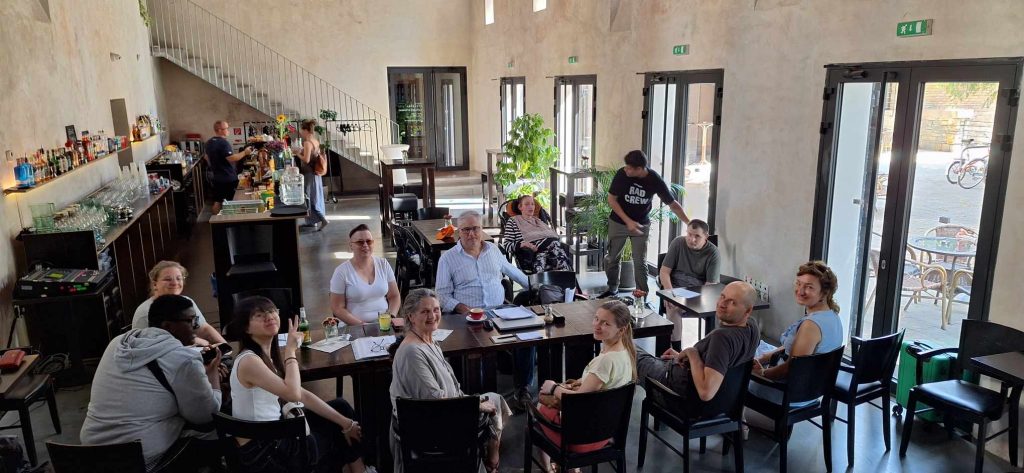It is a great and motivating feeling when a professional meeting is not only useful but also pleasant!
At another face-to-face meeting of our Indeed international Erasmus+ project on independent living in Zilina, we learned a lot about the possibilities, achievements and planned developments of independent living in Slovakia, thanks to our partner Land of Harmony. The headquarters of the organisation is a building with two independent living apartments. Sitting in its pleasant garden, we got to know the organisation, its residents, staff and volunteers.
Later, we had a very interesting visit to the town hall, where we were welcomed by the mayor and deputy mayor, who emphasized that the exchange of experiences with other countries in the field of accessibility is very useful for them. A special team is working on accessibility, bringing together architects, social and transport experts. From an architect’s point of view, the aim is to link history and the future, with accessibility as one of the main tasks. It is important that accessible spaces and public buildings are not designed specifically for people with disabilities, but inclusively, i.e. for everyone together, involving the public and users. There are no specialised rehabilitation architects in Slovakia, where all architects are trained in universal design.
From a social point of view, it was surprising and gratifying to hear that in a city of 80,000 inhabitants, there are 36 municipally owned, rentable, accessible homes available. And they are all in use.
They also make an effort to take care of transport, although when we were there we often had problems with the pavements in wheelchairs and could not get into several buildings because of the stairs.
During a visit to the personal assistance agency, we saw that they do a lot of organising and work to help people with disabilities – with only two staff. Personal assistance in Slovakia is on the right track, but it has not yet fully achieved its goal. A legal regulation was achieved as a grassroots initiative in 1998. Taking into account several criteria (e.g. activity, number of children, social circumstances, availability of a job), it is possible to request the assistance of a personal assistant, which can amount to 20 hours per day per assistant. The support provided is varied: self-care, hygiene, mobility, feeding, shopping, housework, educational-, sporting-, and cultural activities, communication, nursing, organising leisure and holidays, transporting children to school, and stand-by care. There is also a database on clients and assistants, and on the needs, expectations and commitments of both. The exchange of experiences takes place on excursions and at joint cookouts, as there is no special club for assistants.
Unfortunately, personal assistant is not recognised as an independent job in Slovakia either. There is a contract between the disabled person and the assistant, a minimum social security contribution paid by the state and they also get tax relief for working more than a certain number of hours. But there is little income, and people become assistants mainly for personal motivation, so they usually take the job as a second/part-time job. The agency organises campaigns at universities, seminars and also works with the job center to offer this option as a temporary solution for the unemployed.
The New Synagogue, which operates as a cultural space, has become a great favourite of the international team. Here we heard a report about the inclusive festival Jasidielna (Jolly workshop). This colourful, cultural, international festival has been held in Zilina every year for 25 years. People with disabilities also perform as artists or volunteer at this festival. It was fascinating to hear the enthusiasm of volunteers who first got involved in the festival at the age of 15 or 17 and now, at 50, continue to support it as lawyers and NGO leaders. A festival like this is the best opportunity for young people in secondary school to gain direct experience of disability as volunteers.
At the end of the two-day meeting, we returned to the garden to evaluate our experiences with Land of Harmony’s disabled volunteers. It was hard to say goodbye to beautiful Slovakia. Fortunately, we meet online every month, the work continues, and in October we will meet again in person, this time in Pécs/Hungary, hosted by the People First Public Benefit Association.
Read more about the Indeed project here: !ndeed Erasmus+ international project – People First

